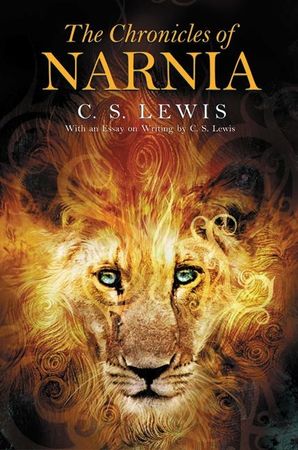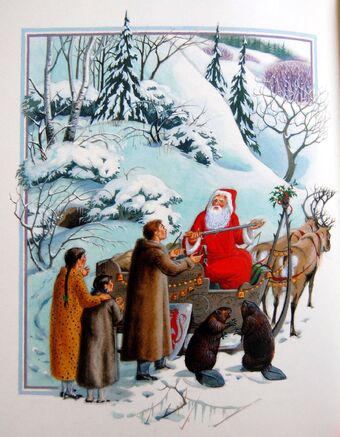Hello dear readers! Welcome back to my blog. I hope everyone is okay during these days. As always, thank you for visiting and reading my posts.
 |
| "The Problem of Susan". Credits to the artist. |
In this world, fantastic creatures rule the land, while most of the humans live in nearby countries. These fantastic creatures include from trolls, to dryads, to talking animals and many more. There is of course lots of magic, adventure and excitement. This world is ruled (in a way) by a magic lion called Aslan, who gives quests to the mentioned children, where they help Narnia solve their problems. At the end of each book (except the last one), the children are sent back to our world.
Narnia is very appealing to fantasy lovers for all its elements of magic and lore (albeit its very random and inconsistent). Many people around the world have cited these books to be among their favorites. They are heavily influenced by Christianity as well; Aslan is meant to represent God, the White Witch is the Devil, Aslan sacrifices himself for the guilty and resurrects, and so on.
I read them as a kid, and I loved them. I read them again as an adult, and now I loathe them with a passion. Mostly because how the author treats his female characters. Dear reader: Narnia hates women. Period.
Before we continue, I warn you: there will be major spoilers for all books.

I will be citing a few pages from my copy of the books, which includes the whole seven into one tome.
 |
| This is the copy I will be citing from. |
For example: in "The Lion, the Witch and the Wardrobe", Father Christmas (a.k.a Santa Claus) gives siblings Peter, Susan and Lucy gifts- because why not? All three receive weapons, but while Peter is encouraged to use them, the girls are told they shouldn't. Susan gets a bow and arrows, but is told she shouldn't attack anyone and instead must use a magic horn that will send immediate help to her wherever she is. Getting help is great, but can't she save herself as well? Lucy is given a knife and a healing potion, and guess what? She shouldn't use the knife. Women here are seen as healers and help seekers, nothing more. In the words of Father Christmas, "But battles are ugly when women fight"(page 162).
 |
| Because reasons I guess |
Excuse you? Mulan saved China, thank you very much. Don't come at me with that "women shouldn't fight" crap.

Next we have all the anti-feminist messages. Starting with the total dependence upon men, this falls especially heavy on Polly and Susan. Polly was the first human girl to travel to Narnia; she witnessed how it was created piece by piece. She was accompanied by Digory, the boy who would eventually become the old professor who takes care of Edmund, Peter, Lucy and Susan. Anyways, Polly in 'The Magicians Nephew" (first chronological book) is submissive in many ways to Digory. For instance, every single time they are about to do something fun or dangerous, Digory asks Polly if she's willing to do it, to which she always replies, "I'm game if you are". The message is basically that she's merely a follower; she'll dare to do things only if he does them first. She never takes a drastic decision on her own.
 |
| Polly Plumer and Digory Kirk, "The Magician's Nephew" |
The next example is with Susan in "The Horse and his Boy". Note that in this book, Susan is already an adult, competent woman and queen. But she never takes decisions by herself. She is a queen, but she only takes a decision after consulting her brothers- not her sister. As if she needed their validation before speaking her mind or making a decision.
 |
| Queen Susan in "The Horse and his Boy" |
Continuing with this train of thought I will address female sexuality and identity in this series. Sexuality as a hole is barely touched in these books. I understand it's a children series, and some topics will not be touched. But how come you enjoy writing about war and murder in almost every single book, yet you treat sexuality as if it's evil? Sexuality is part of the human being, including children. The few characters who are written with some sexual characteristics are women. Guess what? They are all vilified. The White Witch uses more magic than seduction, but her female beauty is seen as evil and even grotesque. The Green Witch from latter books is more of a femme fatale. But the one who gets the worst of it is Susan- again.
 |
| The Green Witch, or Lady of the Green Kirtle |
When Susan becomes an adult, the only thing the author writes about her is her feminine qualities. Already he's relying all importance of her character on her beauty alone; he's presenting her as a sexual figure, which he later vilifies in a most hypocritical way.
After the world of Narnia is destroyed in "The Last Battle", all children go to Narnia's heaven, except for Susan. There are two main reasons for this decision. One, she wasn't dead; she was the only one of all children who didn't die in the end (suck on that Aslan). Second, she was being punished for discovering her sexuality.
In "The Last Battle", she's briefly (and coldly) mentioned by her siblings, "My sister Susan is no longer a friend of Narnia". Eustace, her cousin, states that she doesn't believe in Narnia anymore, to which they add, "She's interested in nothing nowadays except nylons and lipstick and invitations." (page 741)

Of course this is all driven from Narnia's Christian idea. As I mentioned at the beginning of the post, Narnia is heavily influenced by Christianity, and this reflects on the characters including a girl called Aravis. She's from a country south to Narnia called Calormen, which reflects the Muslim culture. The Muslim-inspired characters are portrayed as cruel, stupid, perverts, and are even called ugly for their dark skin.
Aravis herself is seen as somewhat bad for being proud and having a slave. Funny, since the Bible on which Narnia is based on supports slavery. Nevertheless, why is Aravis portrayed so badly? Of course she's proud; she's rich and was raised like a powerful lady. She ran away from home because they were going to marry her to an older, evil man, and her slave took the punishment. Aslan later scratched her whole back for this. I get it, the slave situation was wrong. But how ironic that the only girl who fights for her freedom is portrayed as cold and sometimes cruel.
 |
| Aravis from "The Horse and his Boy" |
Last but not least, I want to talk about women in power. The first ones that come to mind are Jadis the White Witch and the Green Witch. Both are independent women who conquer Narnia in their own way. They both practice witchcraft (therefore they don't follow Aslan's way), use seduction and strength to get what they want, and even though they're evil, they are competent rulers in a way. But of course, these strong and independent women are the two main villains of this series. Other women in power include Susan and Lucy who never do a thing without their brothers' consent, and Aravis who is treated horribly. In other words: C. S. Lewis probably feared or at least disapproved of women in positions of power. Also, I'd like to note that the two women are demonized as witches, whereas Aslan uses magic and it's permitted.
 |
| Jadis, the White Witch, ruled Narnia for 100 years. |
In conclusion, if you don't believe me go and read the book for yourself. You might see how misogynistic the author was, and believe me, I barely touched the tip of the iceberg on this subject. You should read "The Problem with Susan" by Neil Gaiman, where he goes deeper into her psyche; it's fascinating. Overall, I strongly believe C. S. Lewis just had a problem with women in general. And don't come at me with the time period it was written, when L. F. Baum had already given us strong female characters more than 30 years before in "The Wonderful Wizard of Oz", and J. R. R. Tolkien gave us Eowyn in "The Lord of the Rings. C. S. Lewis was just a serious case of fragile masculinity.
P.S. Susan Pevensie deserved better.




No comments:
Post a Comment